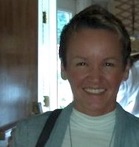I used to live across the street from a little Austrian lady. Hedy’s home was a haven for three-hundred plus birds. Cages lined the walls, and on summer days she would open the windows and let the rest of the neighborhood hear the cacophonic soundtrack of her life. When I worked at a mall bank in the 1980s, before we became neighbors, she was the manager for Noah’s Ark, a pet store. Once, when a canary escaped its cage, we watched from our teller windows as she chased it with a net, yelling for it to come back, oblivious to the reactions of bystanders. She was odd; I admired her old lady pluck.
After we became neighbors we spoke on occasion, though I didn’t seek her out. I was too busy with small children to make time for neighborly chats, but she told me a story once when I’d ventured into her yard to retrieve a wayward child.
“I grew up in Austria,” she’d said. “I came to United States with Joe when he was a G.I.”
She’d married her American soldier husband and followed him to this country. It’d been decades since she’d seen her homeland. Their son, Walter, still lived with her, had never married, never made her a grandmother.
“We met during the war.” Her thick accent was sometimes difficult to understand. “I had a brother, Joe, too,” she said. “He did not come home from the war.”
She fell silent, took on a faraway look. “We lived in a neighborhood where everybody could see the uniformed men coming. They would watch the men, holding papers, coming down the street and wait for them to open someone’s gate. That day they opened our gate. I remember my mother.” Hedy began to cry. She shook her head as if trying to clear the images, like stains, that lingered there. “I will never, as long as I live, forget the sounds she made that day.” Then she changed the subject.
Her story made me uncomfortable. She was elderly, reliving something I couldn’t possibly comprehend. I was a twenty-something mother trying to keep watch on little boys climbing trees and chasing balls into the street. I wanted to find words to soothe her, but none came.
I thought about her again this morning, nearly two decades since that conversation. It was early yet; the street was quiet. I sat near my computer, looking out on the dawning day, sipping my coffee. A vehicle pulled up in front of my house. I didn’t know who it was or why they were there, but they stopped. Out of nowhere I caught a wave of what it would feel like if three (that’s how many my son tells me there are) uniforms got out. For an agonizing instant I choked on a consuming fear, like a presence, that set me back in my chair. After a few breathless moments, the car drove off.
My son had called from Iraq just two days ago, Mother’s Day evening. I knew he was okay, but what if he wasn’t?
When we spoke he’d sounded as exhausted as I’ve ever heard him. “Sorry I didn’t call sooner. We’ve been in River City.”
“Where’s that?” I asked.
“It means that Saturday morning somebody was killed, and no calls were allowed in or out until the family was notified. This is the first chance I’ve had.”
I thought about the flowers he’d ordered for me that had arrived Sunday morning. I thought about the mother, somewhere else, who might have been waiting for flowers but instead got a carload of uniforms. And I thought about Hedy’s mother, her ululation, the unearthly news she’d endured that day, that mothers through the ages have fought to not hear, that another war mom had to suffer through.
 Cyn Kitchen is the mother of four grown children and counts herself plenty lucky to have them in her life. She teaches creative writing at Knox College. Her first book, a collection of stories called Ten Tongues, was published in 2010 by MotesBooks of Louisville, KY. “Living in River City on Mother’s Day” is excerpted from a book-length manuscript about her experience as a Marine mom. It’s called Disaster Preparedness. More information on Cyn is available at cynkitchen.com.
Cyn Kitchen is the mother of four grown children and counts herself plenty lucky to have them in her life. She teaches creative writing at Knox College. Her first book, a collection of stories called Ten Tongues, was published in 2010 by MotesBooks of Louisville, KY. “Living in River City on Mother’s Day” is excerpted from a book-length manuscript about her experience as a Marine mom. It’s called Disaster Preparedness. More information on Cyn is available at cynkitchen.com.
